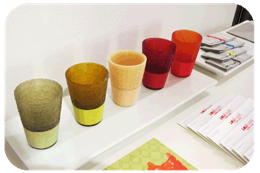 For many entrepreneurs, the best ideas come around when you least expect it. That’s what happened to Chelsea Briganti and Leigh Ann Tucker after they graduated from New York’s Parsons The New School for Design in 2010. In an effort to expand their portfolios, the pair of young designers entered a number of product creation competitions. At one event centered on Jell-O, Briganti and Tucker designed an edible drinking glass using agar, a seaweed-based gelatin that is odorless and tasteless.
For many entrepreneurs, the best ideas come around when you least expect it. That’s what happened to Chelsea Briganti and Leigh Ann Tucker after they graduated from New York’s Parsons The New School for Design in 2010. In an effort to expand their portfolios, the pair of young designers entered a number of product creation competitions. At one event centered on Jell-O, Briganti and Tucker designed an edible drinking glass using agar, a seaweed-based gelatin that is odorless and tasteless.
Their product earned a prize for structural integrity and generated a lot of buzz among participants. But the duo didn’t realize their idea’s full potential until they received an inquiry from Absolut about ordering 60,000 cups for an outdoor concert. In order to turn the product from a resume-booster to a viable business, though, Briganti and Tucker knew they needed to work on their plan even more. After forming a business partnership, the two experimented with various flavors for the cups while also perfecting the signature tasteless version. “We were designers turned candy-makers,” said Briganti. “We had to learn how to translate our design skills to the kitchen.”
Next up came securing investment for their startup. The partners raised more than $10,000 through a Kickstarter campaign and soon after developed a name for their venture: Loliware. The burgeoning company then received an additional $60,000 in angel investments as well as a spot at the Hot Bread Kitchen incubator in Harlem. By 2012, Loliware had enough productive power behind it to fulfill an order for 600 cups. The company’s not stopping there, though. Loliware’s founders hope that one day they’ll be able to manufacture edible cups in bulk. This year Briganti and Tucker are looking to raise $1 million for a nationwide rollout of their cups. If they turn out to be a hit, the company wants to branch out into other items as well, including water bottles.
Questions:
- What key questions did Loliware’s creators consider before moving forward?
- What option do the company founders have if the rollout of their cups is strong?
Source: Jodi Helmer, “Drink Out of Your Glass and Eat It, Too,” Entrepreneur, May 2014. Photo by Inhabitat Blog.
